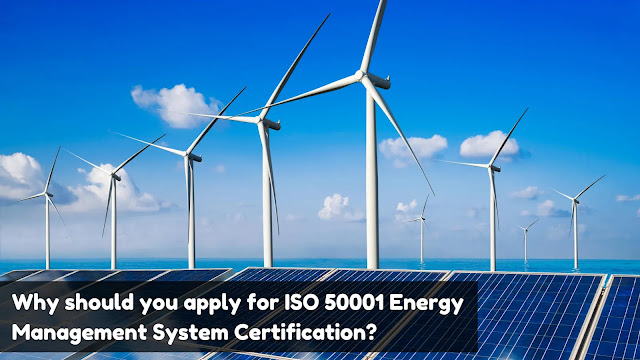Introduction
In today's world, where sustainability and environmental responsibility
are gaining increasing importance, energy efficiency has become a crucial
consideration for businesses. Not only does improving energy efficiency help
reduce costs and enhance environmental performance, but it also contributes to
a positive brand image and strengthens competitiveness. One effective way to
achieve significant energy savings and optimize energy management is through
ISO 50001 Certification.
What is ISO 50001?
ISO 50001 is an internationally recognized standard that provides a
framework for organizations to establish, implement, maintain, and improve an
energy management system (EnMS). This standard is designed to help businesses
enhance energy performance, reduce energy consumption, and improve overall
energy efficiency.
Benefits of ISO 50001 Certification
ISO 50001 Certification offers several compelling benefits for
businesses seeking to improve their energy efficiency. Firstly, it provides a
systematic approach to energy management, enabling organizations to identify
and prioritize areas for energy savings. By implementing the requirements of
ISO 50001, businesses can establish a culture of energy efficiency and engage
employees at all levels.
Moreover, ISO 50001 Certification is a globally recognized credential
that can enhance the reputation and credibility of a business. It demonstrates
a commitment to environmental responsibility and sustainable practices, which
can be appealing to customers, partners, and other stakeholders.
How ISO 50001 Can Help Boost Business's Energy
Efficiency
ISO 50001 provides a structured methodology to
achieve continuous improvement in energy performance. By adopting this
standard, businesses can identify energy-saving opportunities, implement
energy-efficient practices, and monitor the results over time. ISO 50001 promotes
a proactive approach to energy management, ensuring that energy performance is
monitored, measured, and optimized on an ongoing basis.
ISO 50001 Requirements
ISO 50001 Certification requires organizations to establish an energy
policy, set energy objectives and targets, conduct energy reviews, and identify
significant energy uses. It also involves implementing energy-saving measures,
monitoring energy performance indicators, and conducting regular energy audits.
Compliance with ISO 50001 involves a commitment to continuous improvement in
energy performance, driven by data analysis, corrective actions, and management
review.
Integrating ISO 50001 with Existing Management
Systems
ISO 50001 can be seamlessly integrated with other management systems,
further enhancing the benefits and synergies across various areas.
ISO
50001 and ISO 9001 (Quality Management)
Integrating ISO 50001 with ISO 9001, the standard for quality management,
allows businesses to align their energy efficiency efforts with overall quality
objectives. By incorporating energy considerations into quality management
processes, organizations can optimize energy consumption while maintaining
high-quality products and services.
ISO
50001 and ISO 14001 (Environmental Management)
ISO 50001 and ISO 14001, the standard for environmental management,
go hand in hand in fostering sustainability and reducing environmental impacts.
Combining these two standards enables organizations to establish a
comprehensive approach to environmental performance, encompassing energy
management, waste reduction, emissions control, and more.
ISO
50001 and ISO 45001 (Occupational Health and Safety)
Integrating ISO 50001 with ISO 45001, the standard for occupational health and
safety, ensures that energy management activities consider the well-being of
employees and promote a safe working environment. By linking energy efficiency
with occupational health and safety practices, businesses can create a holistic
approach that benefits both employees and the environment.
Conclusion
Implementing ISO 50001 Certification is a strategic step towards
improving your business's energy efficiency and environmental performance. By
establishing a structured energy management system, setting clear objectives,
and implementing energy-saving measures, organizations can achieve significant
cost savings, reduce environmental impacts, and enhance their brand reputation.
Furthermore, integrating ISO 50001 with existing management systems can create
synergies and maximize the benefits across various areas.
So, take the initiative to boost your business's energy efficiency with ISO 50001 Certification and unlock the potential for long-term
success in a sustainable world.
FAQs
What
is the difference between ISO 50001 and ISO 14001?
ISO 50001 focuses specifically on energy management, while ISO 14001 is
a broader standard for environmental management. While both standards aim to
enhance sustainability, ISO 50001 is dedicated to improving energy performance,
while ISO 14001 covers a wider range of environmental aspects.
How
long does it take to achieve ISO 50001 Certification?
The time required to achieve ISO 50001 Certification varies depending on
the organization's size, complexity, and readiness. It typically takes several
months to a year to implement the necessary processes, gather data, and
demonstrate compliance with the standard's requirements.
Can
ISO 50001 Certification help reduce energy costs?
Yes, ISO 50001 Certification can lead to significant energy cost
savings. By identifying energy-saving opportunities, implementing efficient
practices, and continuously monitoring energy performance, businesses can
optimize energy consumption and reduce operational expenses.
Is
ISO 50001 Certification mandatory for all businesses?
ISO 50001 Certification is voluntary, and it is up to each organization
to decide whether to pursue it. However, achieving ISO 50001 Certification demonstrates
a commitment to energy efficiency and can provide a competitive advantage in
the market.
Can
ISO 50001 Certification be combined with other Certifications?


